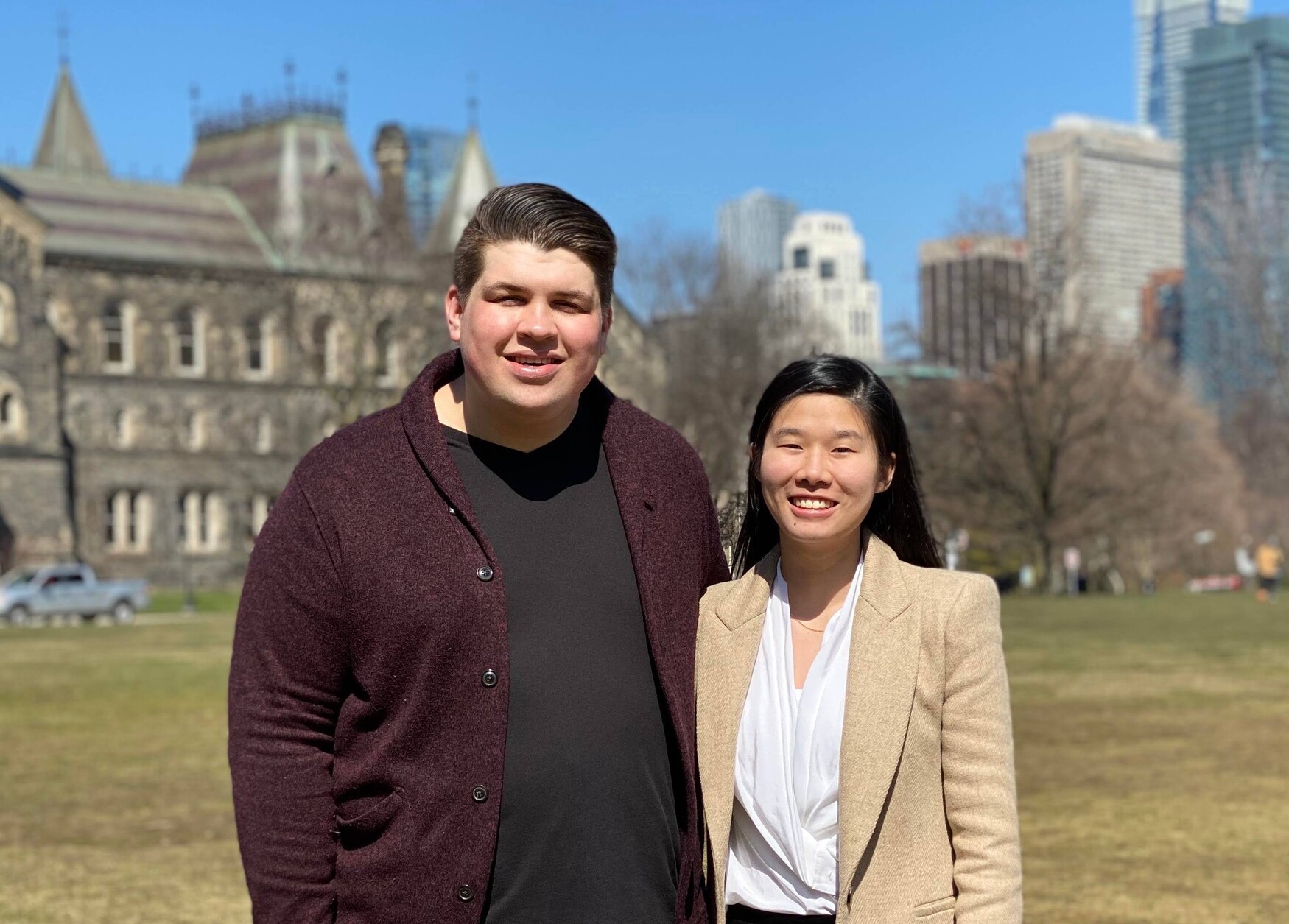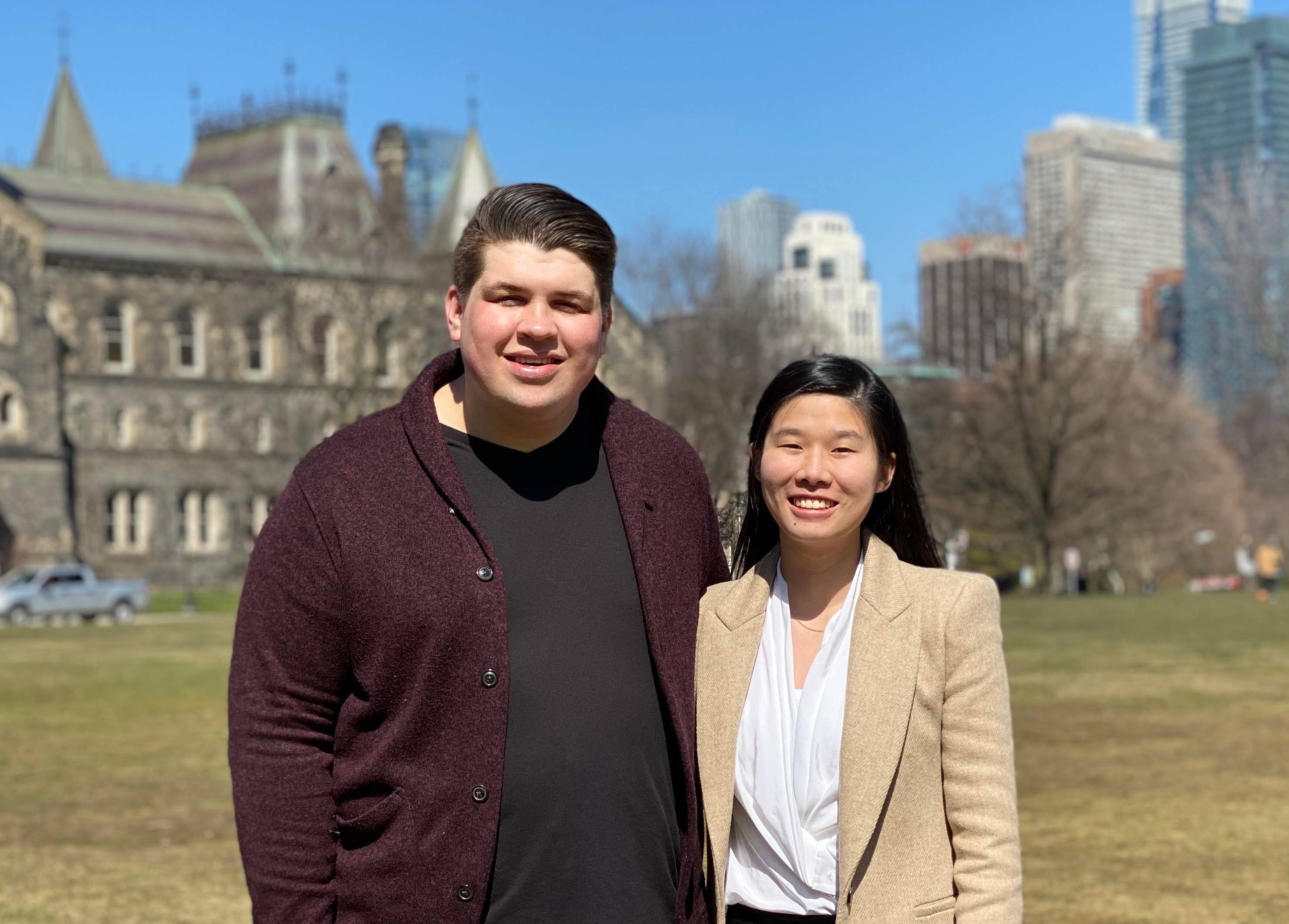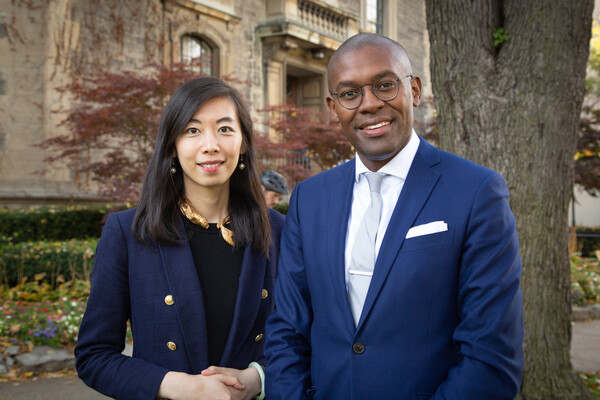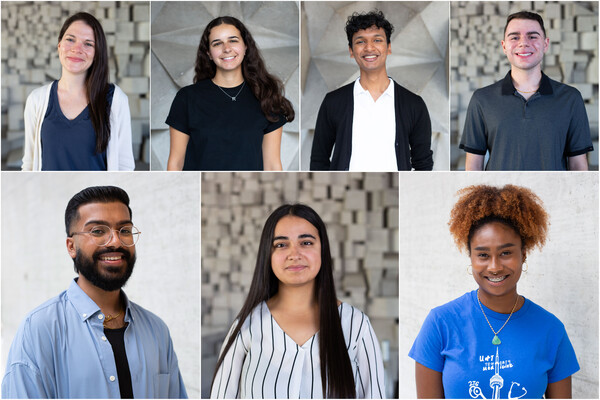Breadcrumbs
- Home
- MD/PhD Program
- News
- Medical Students Organize Health Advocacy Conference
Medical Students Organize Health Advocacy Conference

Ciara Parsons

University of Toronto medical students have come together to organize the Conference on Health Advocacy Toronto (CHAT), which will take place virtually on Saturday, April 4.
The conference includes 38 advocacy projects by medical students and learners in allied health professions, and features notable health leaders including Dr. Jane Philpott, CHAT’s keynote speaker.
The CHAT organizing team includes Hilary Pang, David Wiercigroch, Sabrina Yeung, Aarushi Bansal, Kyra Moura, Mona Khalid, Monica Shah and Emmanuel Igbokwe.
CHAT co-founders Pang and Wiercigroch recently spoke with writer Ciara Parsons about their motivation for creating the conference, the types of projects included, and why in the midst of the COVID-19 pandemic they feel the conversations sparked at this conference will be increasingly relevant.
See profiles of health advocacy projects led by CHAT organizers at the end of this Q&A.
Why did you start CHAT, and can you tell us a bit about it?
We founded the Conference on Health Advocacy Toronto with the vision of bringing together passionate health advocates. We wanted to create a space where the incredible work being done at the local, provincial and national levels could be recognized, shared and discussed. Every year, we hear about inspiring grassroots initiatives, public health campaigns and health advocacy projects, but there are few formal opportunities to come together to discuss them and share learnings.
The conference theme is ‘Creating Conversations: Advocacy for Canadian Health’ and it includes important topics like public policy, health services, public health, medical education, health history, health equity and health technology and innovation. Our oral presentation sessions feature over three dozen projects led by medical students and learners in allied health professions from U of T and various schools across Ontario and Quebec.
Due to the COVID-19 pandemic, we adapted our conference to become completely virtual and it’s exciting to now see participants from British Columbia to Newfoundland able to register. In unprecedented times like these, we believe that CHAT’s mission to create conversations and community is more important than ever.
How did you choose the guest presenters and workshop hosts for this year’s conference? What can guests expect to learn?
This year, Dr. Jane Philpott is the conference keynote speaker, with Drs. Najma Ahmed, Edward Xie and Samantha Green participating as workshop leaders.
When planning our conference, we wanted our speakers to reflect the different levels at which advocacy takes place, namely through national, provincial and community initiatives. Our goal is to highlight the many ways available to spur positive impact and bring about positive change. We also felt it was important to spotlight current ‘hot topics’ in health care which have been receiving increasing attention, and we hope they can serve as examples to our delegates on how to grow an advocacy initiative and navigate barriers to change.
What are you most looking forward to about the conference?
Our team is looking forward to seeing our hard work come together and connecting with our guests, who are undoubtedly passionate about health advocacy. Planning a new conference from the ground up is no small undertaking. The process had its challenges, especially while moving through our clerkship year, which can get busy. But we have a great diversity of projects represented, and they really reflect the engagement of medical students, learners in allied health disciplines and health care professionals in advocacy-related work.
We would like to gratefully acknowledge and thank our faculty advisors, Drs. Abi Sriharan, Jennifer Hulme and Philip Berger for their wisdom and guidance throughout the planning process.
Health Advocacy Projects by CHAT Organizers

Equitable access to care for vulnerable populations is an area I am passionate about. Particularly, I have been involved in efforts to address the opioid crisis and co-chaired the Opioid Task Force with the Canadian Federation of Medical Students. Together, we collaborated to develop recommendations in the realms of health policy and medical education to address the crisis. I have had the opportunity to act on these evidence-based recommendations by contributing to Health Canada’s consultation on strengthening the Canadian Drugs and Substances Strategy and participating in the development of a pan-Canadian curriculum for medical students around pain, opioid use and addiction. Through my involvement with research projects, I have also been able to examine novel approaches to ensuring patients with opioid use disorder can access lifesaving treatment.

My advocacy work has primarily focused on improving access to care, a key indicator of health care quality. As co-chair of the Canadian Federation of Medical Students’ (CFMS) Pharmacare Task Force, I led a national committee to conduct a pan-Canadian medical student study to develop evidence-based health policy and medical education recommendations for a universal, public and national drug insurance plan. As the CFMS National Officer on Health Policy, I led the strategic visioning of the advocacy portfolio through the publication of guiding documents. Lastly, I have been involved in several health services research projects which study the socioeconomic disparities in access to cancer surgery among three international health systems (Canada, USA, and Australia), access to virtual care for older adults and quality of care for patients with chronic pain.

Most of my past health advocacy work has been focused on increasing the involvement of children with special needs in sports and physical activity. I first became engaged with this community in high school as a synchronized swimming coach at Variety Village, an all-abilities facility in the city’s east end. Since then I have worked to push the introduction of programs for these athletes across the province, and I am currently working with Special Olympics Ontario on their customized Rowan’s Law policies. I think it is important to remember that many of our unique populations in healthcare that often receive specialized care can also benefit from the several preventative health measures we use in other populations.

I am passionate about advocating for mental health awareness to reduce stigma surrounding mental illness. I started Beneath the Surface: Invisible Narratives of Visible Disease in 2019, an initiative that aims to shed light on the psychosocial issues often accompanying the physical manifestations of disease across all specialties. As part of this initiative, I am working to aggregate and share current research, compile mental health resources available in the GTA and promote patient stories of those who have found success in positively reframing their impairment.

My advocacy work is focused around diversity in medicine and removing language barriers in medicine. I am co-creating a mobile application named MyLingual MD to help healthcare professionals who are fluent in a non-English language, improve their communication skills in that language to be comfortable in speaking to patients. As students living in a multicultural society, our goal is to improve care delivered to non-English speaking patients.

My interests within advocacy shifted when I started medical school and became more aware of the racial barriers that currently exist in our healthcare system. I am now a member of the Black Medical Students’ Association (BMSA) and the Filipino Association of Medical Students (FAMS) at UofT, where advocacy remains a fundamental pillar through all our initiatives. Both associations have opened my eyes to the complex issues marginalized communities continuously face while navigating our healthcare system. I have also had incredible opportunities supporting Black and Filipino high school and undergraduate students on their journey to medical school.

I first learned what it meant to be a health advocate when I began medical school. Over the last three years, I have developed several interests. As a member of the Black Medical Students Association (BMSA) I have been involved in planning and executing several events that draw attention to the need for diversity in healthcare, and address the impact that underrepresentation has on our healthcare system.
In 2018, I served as one of the six student coordinators for the inaugural national day of action against gun violence—an event that was coordinated across the country to draw attention to key firearms legislation and the healthcare crisis created by gun violence.
I am also very passionate about resource stewardship, and quality improvement especially its intersection with Orthopaedic Surgery. Currently, I am involved in an initiative that aims to address improper antibiotic prophylaxis in patients prior to elective joint replacements.

Pursuing medicine has allowed me to appreciate the great privilege that I have of being a health advocate, especially at the microlevel. For me, advocacy starts by observing and listening to each patients’ story. By inviting conversations that may be challenging for patients to address, I am able to understand their specific needs. This in turn has helped me tailor individualized care plans, which have included modifying the format or delivery of patient education, or referring to additional community supports, all while reassuring patients and families that I am on their team. I am passionate about providing equitable access to care, education and learning. These stem from my past involvement in research aimed at understanding the psychosocial and ethnocultural barriers in access to care, as well as my previous role in developing scientific community outreach programs for families and youth in the GTA.
News


